Living with the Earthquake

|
Lat:
34:22.080000
Long:
73:28.020000
Living with the Earthquake
29th November 2005
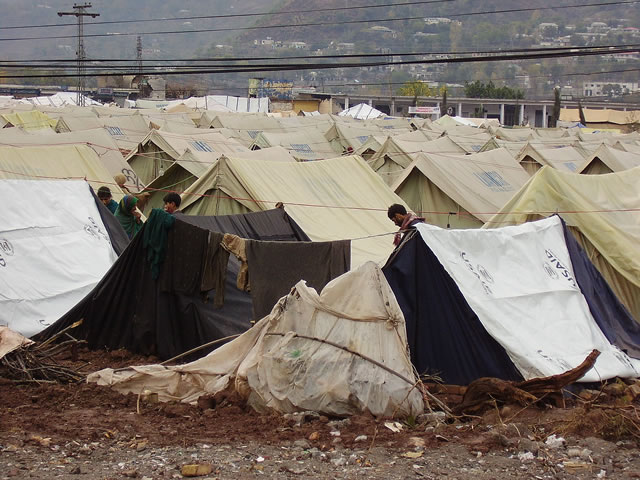 With my days numbered in Rawalpindi it was once again time to
think about rejoining the road and heading North to China. With horses that
thought is never far from your mind and I always feel terribly uncomfortable
staying in one place for longer than a couple of days. Yet before I left
something happened that I will always treasure. With my days numbered in Rawalpindi it was once again time to
think about rejoining the road and heading North to China. With horses that
thought is never far from your mind and I always feel terribly uncomfortable
staying in one place for longer than a couple of days. Yet before I left
something happened that I will always treasure.Purda
In most Pakistan families the concept of ‘Purda’ is strong, meaning that it is forbidden for a woman to be seen by an outsider. Mostly women remain within the home and when they leave it they must cover their face and body.
For days I had been living as a hermit in the Ejaz backyard seen only occasionally by two annoying roosters, a clutch of chickens and several annoying local children. The family lives in a two storey house. The living quarters were downstairs. Whilst I was allowed upstairs there was an unspoken agreement that I wasn’t allowed down. Then one day without warning I was invited ‘down’ for lunch. I was awestruck. Being a foreigner, male and non-Muslim the odds against this are high. Why now? Why me? Usually it’s only foreign women invited into a Muslim family’s ‘inner-sanctum.’
A morning after a full night of rain
Now I was controversially sat with the head of the family, Haji Muhammad Ejaz, across a low table eating yogurt, bread, rice and fried vegetables. We were the only two in the house. We discussed politics, my ride and the tragic death of his wife in a non-descript room adjacent to the kitchen.
It wasn’t special because of the meal or the discussion. It wasn’t even the location, (however hallowed I thought it at the time). It was the fact that I’d been ‘accepted’ into the family. Thereafter the transition from guest to family member couldn’t have happened quicker. Suddenly children were playing around my tent, family women began openly coming and going (while I was present) and later that night I met the whole family, including Shahid’s wife.
I realized that this family was just like any other normal family the world over. It was only tradition that had formed the invisible impersonal barrier between me and them. However much I’d tried to understand, I’d always felt there was something secretive and special that perhaps such families were trying to hide. I felt foolish afterwards but with the highest sense of honour at being accepted. (Note : At the time Shahid’s wife, Omar, was pregnant and several days later Shahid rang me from the hospital to inform me of his newborn baby’s birth). Interludes
Six weeks to go. By any stretch of the imagination no sane person would be on two horses, riding into the middle of Winter over the worlds highest mountain range. So why was I? Why did I leave it so late? One reason of course is the Earthquake which caused a lot of uncertainty. Should I continue? What is more important? Whose lives should I be helping now? But at some point I have to admit I needed a deadline and none could be more final than the closure of the Pakistan-China border. Perhaps there’s also a perverse pleasure in racing against time. Whatever it may be, there wasn’t much time left. 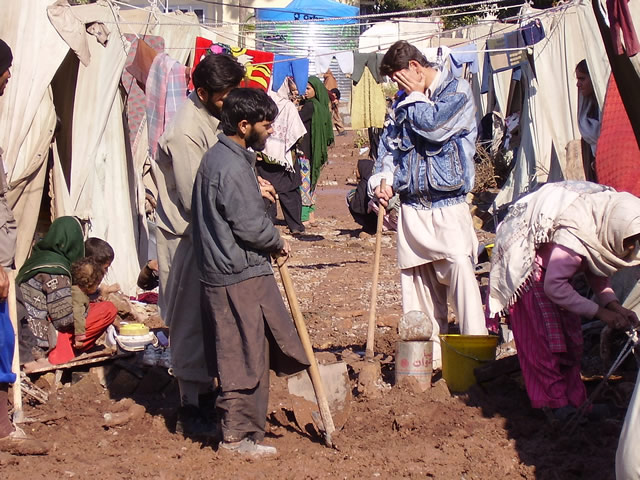
I had several interludes on the road to the next major town at Muree. Notably, these included; a stay at the stables of Mustaq who ran a riding school in Islamabad, a night spent in the forecourt of a buffalo yard with an owner who thought I was a vet and wanted me to treat the bulbous severed tail of one of the less fortunate females who bellowed loudly as I did my best with Iodine and cottonwool. Yet it was a stay at an orphanage on the road that peeked my curiosity the most. Looking like a Las Vegas Casino on the hilltop, the building I arrived at was anything but. Sirat-ul-Jannah (’The way to Heaven’) is an orphanage that caters to several hundred orphan children. It was setup by a British lady called Mrs. Gulfran Qureshi. She has recently converted to Islam. I can’t really say more than that. My main memories were of being served sausage, potato and baked beans and being immensely impressed with the effort that one person has gone to, to alleviate the suffering of others. Scrabbling into Muree
Nights soon got cooler and the road more difficult for the mares to manage. From Islamabad we hiked upwards each day seeing the low hills gradually morph into cliff edged ridges and the condition of the road rapidly deteriorate. Both Sparks and Kabul found the going tough. Sparks wasn’t used to the ups and downs and the road was extremely slippy, reducing us to a walk after she fell for the third time. Kabul (my mare from Afghanistan ) barely battered an eyelid throughout the whole incident. Walking with one in front of the other she just keeps going, calm and aloof to the ice skating maneuvers of the mare in front. They are both proving thankful for the extra blankets I had locally made in Islamabad.
In Muree I stopped for five days to complete various admin tasks and stock up on last minute equipment to tackle the coming cold weather. I visited an excellent example of a community run school assisted by
NRSP and spent some time at their nearby office. The town was quaint with a definite colonial flavour. In times long gone, Muree used to serve as the hill station retreat for affected British governors and their families. Iron rail fencing, Victorian style buildings and a resort type feel gave the place a holiday air.
Read more about the school visit to Community public school, Jamiabad Entering Azad Kashmir
Entering Kashmir is like entering another universe. One run by the United Nations and the Pakistan Army. Relief trucks from one agency or another buzz along the roads in and out of the country[1] Erect buildings are a commodity and it’s a hardened people left now to pick up the pieces. The Earthquake more or less flattened most of this region. Even as I trotted across the Jhelum River , the defacto ‘border,’ two Chinook helicopters thudded overhead and a raft of signs proclaimed the presence of international aid agencies. In Pakistan the people have a life. In the Earthquake Area they are searching for a new one. Another universe.
At eight o’clock on a cold chilly night, local people began telling me about a relief camp that I could ’stay’ at on the road to Muzaffarabad. There was news of a group of Britishers who were running it and it seemed an ideal place to aim for. I was initially dazed on arrival by the sight of a thousand lights strung in rows along the roadside. Tents upon tents seemingly stretched away into the darkness. It was the first relief camp I had come to and has remained the most interesting. The camp was run by Dewan Salman , Pakistan ’s second largest Oil conglomerate. At the time of the Earthquake, Dewan decided to get involved and began setting up relief camps with no prior experience. They have walked a border line to disaster ever since but miraculously have kept from falling over. Nobody is running this camp but fate. It is being run on a people first, questions later basis and nobody has been turned away yet. No matter the problems, the camps run by this oil company have proven the last port of call for a lot of desperate families who couldn’t get lodgings else where.
The first Dewan camp was set up in Muzaffarabad outside of Norral stadium (also home to a Red Cross medical camp). Following Dewan philosophy the camp was soon approaching capacity and a second site was needed. Whilst away from the camp one day, the camp manager, Javed, came across the Chatterglass site where I was currently stabled. He saw expanses of grassy farmer’s fields in an overtly hilly terrain and through unorthodox tactics a new camp was born.[2]
The Chatterglass camp was well thought out and planned in accordance with UN guidelines.[3] On the night I arrived the management team was erecting a further 80 tents to accommodate a fresh influx of families. The camp was effectively run through the destiny of a young Englishman called Luke - whose previous experience was managing the medical kit store of Nomads travel, UK. Dewan Salman wants this camp to become the biggest in Pakistan . An obvious advertisement but one that will secure international attention and enforce better living conditions for the inhabitants. I didn’t have the time to speak with many of the occupants but the camp seemed very well run having a school and a mosque. It was almost heaven compared to the tangled web I found in Muzaffarabad a day later. Norral stadium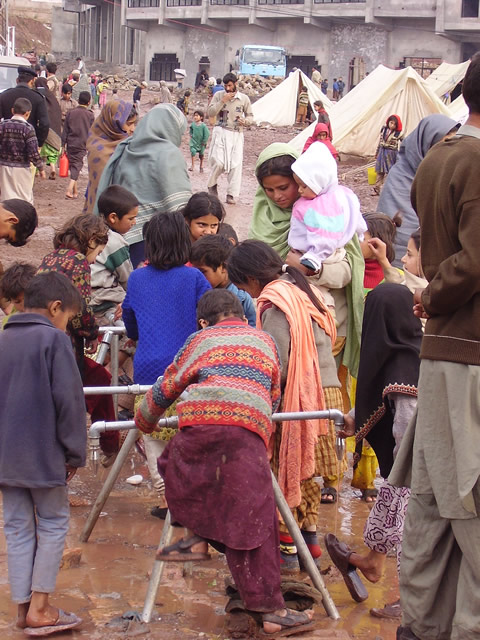
If Chatterglass was what a relief camp should be, Norral stadium was what I thought a relief camp would be. Five hundred tents, five hundred families. Mud, tent rope, crap and humanity all thrown into huge mess with Winter approaching. But this was the place that I realized what the words ‘humanity’ and ‘human spirit’ really meant.[4]
Read about Al Fajr Tent school, Garhi Dupatta
The biggest camp in Muzaffarabad marched around the exterior of the stadium. Water was provided from special containers supplied by Oxfam. Food was dealt from a large kitchen housed inside Dewan’s Camp ‘office’. The school was a shanty town one of a few tattered pieces of plastic on the odd pole, yet still functional. The mosque was slightly better. This could have come from one of many African crises broadcast on TV screens worldwide all my life. This was just a glimpse. Here is another. The following are three people whose very survival depends on the generosity of others.
?€? Asad Ali Kazmi - 21 years old with two girls and boys. Eight family members. Landslide came and wiped his home off the face of the Earth. Staying in camp until April when the six foot deep snows around his village have melted. Relief arrived at his camp on Eid (three weeks too late). He was a gift shop owner.
?€? Shahbab Aziz Qureshi - was fighting to keep water out of his home when I met him. He had no proper fly sheet (only cheap plastic sheeting) and was digging ditches around his tent with his hands. Complained of no mattresses for his small children.
?€? Khawaj Mohammad Younas - 30 years old with one girl and boy. Was loading the broken cement from a nearby house into a sack to act as a foundation for a path between tents in his ’sector’. See photo right.
During my stay, rain swamped the campsite motivating three thousand people en masse to dig ditches, repair holes and shore up the sides of each tent. When the camp was first erected people (incl. women) were using the toilet outside the door of their home. They had toilets available. A group of volunteers led by ‘Mother Mary and Saint Dave’ gave the people materials and encouraged them to ‘beautify’ the front of their tents with stones and plants etc… The tactic worked. Now people are proud of what little they have and it showed me an important point. When the people are allowed/shown how to take matters into their own hands they so do with vigour . Nobody wants to live in squalor forever. 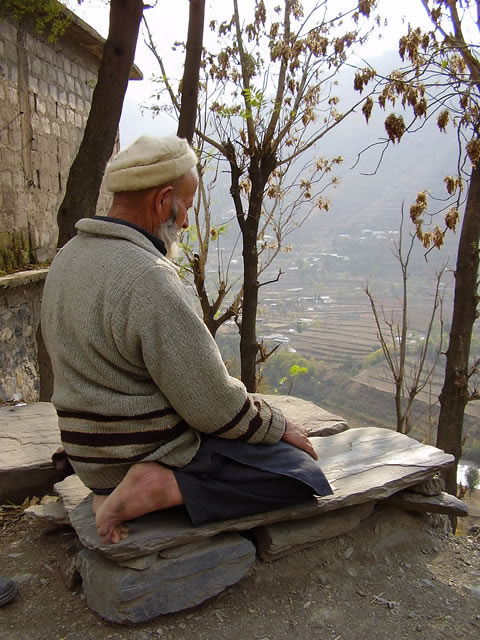
Dewan has its own problems as do the people. Being poor, many hoard things given to them and then ask for more (e.g. mattresses). Dewan was in the process of moving many of the occupants to the new clean site at Chatterglass as I left for Balakot. New wider ‘roads’ were being talked of between and the company seemed committed to settling the people for the coming Winter.
My interest here is that I want people to read this, understand and know better for the future. Better understanding means better help in better ways. In future crises. The bottom line is that out of all the camps I saw, Dewan was prepared to take whatever steps necessary. They undoubtedly will gain from the publicity their efforts generate but who cares if the people benefit as a result. Homeless people will at least now have a roof over their heads. Other
Jottings…
|
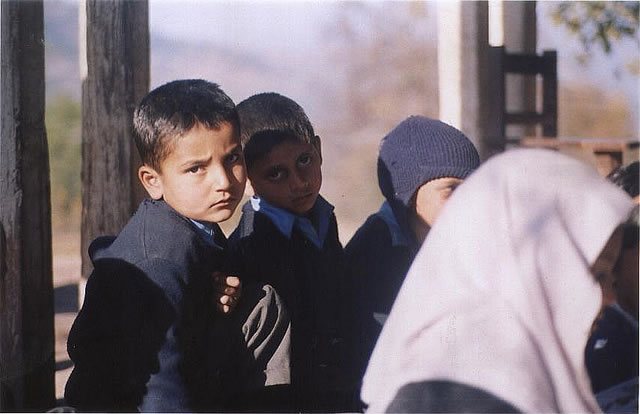 Fate plays us strange cards and many
fell on my journey from this point onwards. I often wonder at the meaning of an
occurrence but I do know that this one was special because it showed me
everything that I wanted to see.
Fate plays us strange cards and many
fell on my journey from this point onwards. I often wonder at the meaning of an
occurrence but I do know that this one was special because it showed me
everything that I wanted to see.